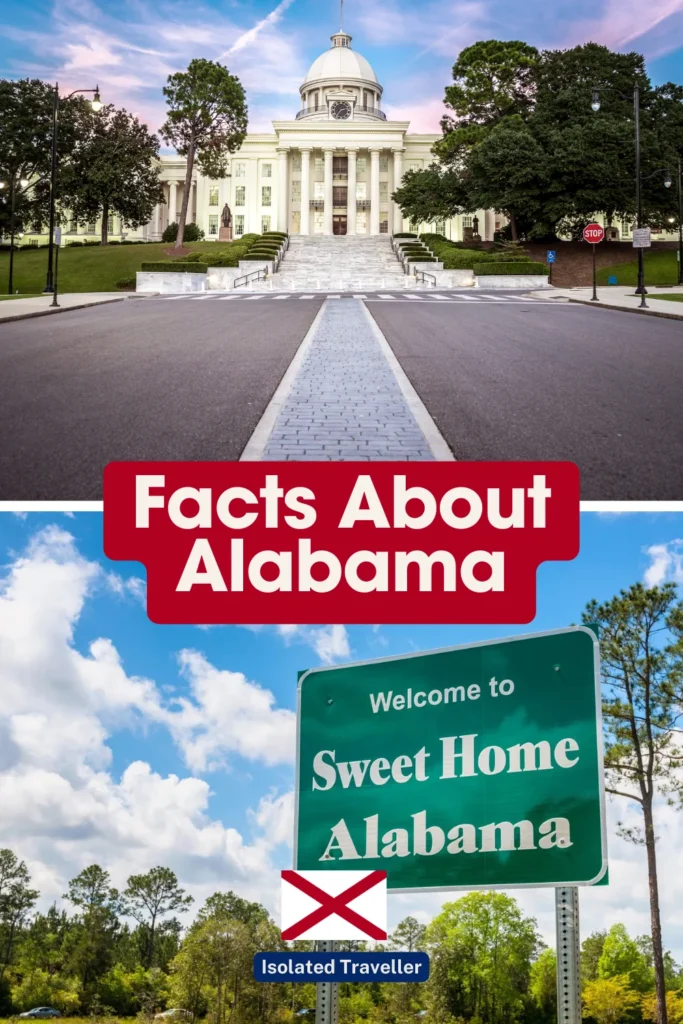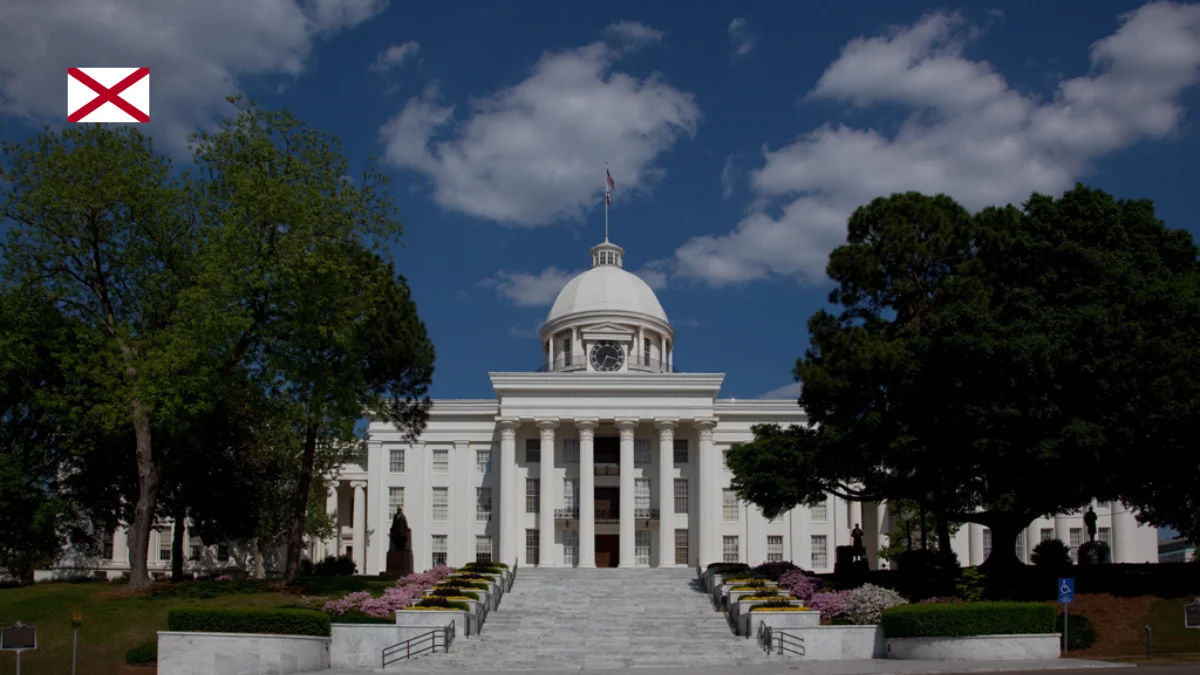Facts About Alabama
Alabama became the 22nd state of the United States on December 14, 1819.
The name “Alabama” comes from the Choctaw words “Alba” (vegetation, herbs) and “Amo” (gatherer), roughly translating to “vegetation gatherers” or “clearers of the thicket.”
Montgomery is the capital of Alabama.
Alabama’s state motto is “Audemus jura nostra defendere,” which means “We dare defend our rights.”
Birmingham is the largest city by population and has historically been a major industrial centre, especially in iron and steel production.
Alabama is bordered by Tennessee to the north, Georgia to the east, Florida to the south, and Mississippi to the west.
Alabama has a diverse geography that includes the Appalachian Mountains, the Gulf of Mexico coastline, and the fertile plains of the Black Belt.
Alabama is Known as the “Heart of Dixie” due to its central location in the Deep South.
Alabama is called the “Yellowhammer State,” after the state bird.
Alabama played a central role in the American Civil Rights Movement. Major events include the Montgomery Bus Boycott (1955-1956) and the Selma to Montgomery marches (1965).
The first Confederate capital was Montgomery before it moved to Richmond, Virginia.
Alabama has the longest constitution of all the 50 United States, which has 300,000 words.
Huntsville, often referred to as “Rocket City,” is home to the Marshall Space Flight Center and has been pivotal in the development of the U.S. space program, including the Saturn V rocket used for Apollo moon missions.
The Saturn V rocket that put Neil Armstrong on the moon in 1969 was built in Alabama and is now a state landmark.
Alabama has a rich musical heritage, especially in country, blues, and gospel music.
Alabama is home to diverse natural attractions like the Gulf Shores beaches, Little River Canyon, and the Mobile-Tensaw Delta, one of the largest river deltas in the U.S.
Alabama is 52,419 sq. miles in size.
The annual Iron Bowl, a football game between the University of Alabama and Auburn University, is one of the most significant sporting events in the state.
Alabama is Home to several notable institutions, including the University of Alabama, Auburn University, and Tuskegee University, which was founded by Booker T. Washington and is famous for the Tuskegee Airmen during World War II.
Alabama was the first state to declare Christmas a legal holiday, in 1836.
In 1861, it was one of the first states to secede from the Union, precipitating the Civil War.
The state tree of Alabama is the Southern Longleaf Pine.
Cheaha Mountain, often called Mount Cheaha, is the highest natural point in Alabama at 2,407 feet above sea level.
Alabama is the only state that can produce iron and steel with its own natural resources.
The first 9-1-1 call was made in Haleyville, Alabama on February 16, 1968.
Lake Guntersville in north Alabama is the largest body of water in the state.
The first successful heart surgery on a living patient was performed in Alabama in 1902.
Approximately 43% of all the types of snails in the United States live in Alabama
Dothan is home to the largest peanut festival in the world.
Alabama is home to the world’s largest cast iron statue, Vulcan, the Roman God of Fire and Forge.
Alabama is home to Coon Dog Cemetery which is the only one of its kind worldwide.
The Moundville Archaeological Park preserves one of the most significant Native American archaeological sites in the United States.
The Mercedes-Benz plant in Tuscaloosa was founded in 1995 and was the first major Mercedes-Benz plant outside Germany.
In recent years, Alabama has become a hub for the automotive industry, with major manufacturing plants for Mercedes-Benz, Honda, and Hyundai located in the state.
One of the pirate ships featured in Disney’s “Pirates of the Caribbean” film franchise was built at Steiner Shipyard in Bayou La Batre.
All ground sloths known in Alabama date to the Pleistocene Epoch, also known as the Ice Age.
Alabama is known for its contributions to American literature, with notable authors such as Harper Lee (“To Kill a Mockingbird”) and Truman Capote (“In Cold Blood”) hailing from the state.
The Tennessee River, the largest tributary of the Ohio River, winds its way through northern Alabama and forms part of the state’s northern border.
The biggest NASCAR oval is Talladega Superspeedway in Talladega, Alabama.
The world’s biggest motorcycle museum is in Birmingham at Barber Vintage Motorsports.
The Wright brothers established the first civilian flight school, the Wright Flying School, in Montgomery in 1910. This marked an important milestone in the early days of aviation.
The first electric trolley system in the world was introduced in Montgomery in 1886.
The Tuskegee Airmen, the first African American military aviators in the United States Armed Forces, trained at Moton Field in Tuskegee during World War II.
Oak Mountain State Park is the largest state park, featuring nearly 10,000 acres of diverse terrain and recreational facilities.
The Alabama Shakespeare Festival, held annually in Montgomery, is one of the largest Shakespeare festivals in the world and showcases performances of the Bard’s timeless works.
Alabama native Jesse Owens, known as the “Buckeye Bullet,” won four gold medals in track and field at the 1936 Berlin Olympics, defying Adolf Hitler’s notion of Aryan supremacy.
Joe Louis, born in Chambers County, Alabama, was one of the most dominant heavyweight boxers in history, holding the title of world champion for nearly 12 years.
The Port of Mobile is one of the largest ports in the United States, playing a crucial role in international trade and the state’s economy.
Alabama has been the birthplace of several prominent figures, including civil rights leaders Martin Luther King Jr. and Rosa Parks, singer Nat King Cole, and baseball legend Hank Aaron.
The state is home to several significant military installations, including Redstone Arsenal in Huntsville, Maxwell Air Force Base in Montgomery, and Fort Rucker, the primary flight training base for Army aviators.


